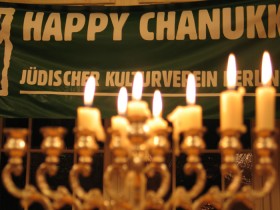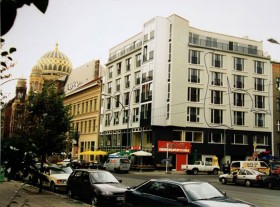
Hanukkah Candleholder at the 15th Hanukkah Ball of the Jewish Cultural Center, Berlin 12.12.2004 © Photo: Igor Chalmiev, gift of the Jewish Cultural Center to the Jewish Museum Berlin
25 years ago today, on 22 January, 1990, the Jewish Cultural Center was founded. One month earlier, on 13 December, 1989, the press agency ADN published an appeal in numerous East German newspapers. It announced a new coalition of Jews living in East Germany who were committed to spreading the knowledge of Jewish culture and history. The appeal was not an accident:
As early as 1986, secular Jews had found themselves gathering, at the invitation of the Jewish Congregation of (East) Berlin, to explore their Jewish roots – a heritage that no longer played any role in their parents’ identities. A group called “We for us – Jews for Jews” formed out of this second generation of political emigrants who had returned to Germany and grown up in the East. During their regular meetings, they got to know a vibrant Jewish culture, celebrated holidays, and held discussions and arguments – even about politics. Committees emerged, theater productions and lecture series were organized, and eventually the group – though regarded at times suspiciously by the Jewish Congregation – came to be firmly established as part of the community even as it was open to the broader public. The political upheavals in 1989 finally made it possible to implement the idea of an independent Jewish Cultural Center. The appeal prompted hundreds of responses from all over East Germany, including many non-Jews who were interested in becoming members or providing assistance. Since Jewish heritage was subsequently made a prerequisite of membership, these interested parties were named “Friends” of the Center.

Dancers at the Hanukkah Ball of the Jewish Cultural Center, Berlin 20.12.2003 © Photo: Metin Yilmaz, gift of the Jewish Cultural Center to the Jewish Museum Berlin
While only 66 people participated in the founding assembly on 22 January, 1990, the first plenary session on 31 March saw an increase to 280, more than 200 of whom were already members. The board – initially called the Speakers Council – assumed leadership and in 1991 the Center applied to the official Register of Associations, receiving non-profit status a year later. In compliance with its charter, the Center spent the following years developing a wide variety of activities that served to impart greater understanding of Jewish culture and history: it supported research projects, offered older members attention and care, and taught the principles of religious life. This final endeavor generated controversy time and time again. Dr. Irene Runge, the founding member of the board, fought passionately on behalf of the Center’s religious function. She believed: “… It is not acceptable to run a Jewish Cultural Center from the perspective of non-Jews – to talk about Judaism instead of living it. If we, as Jews, want a Jewish Cultural Center, we can’t set out by turning our backs on the sources of Judaism. Rather, the Center must find its own way to commit to this tradition as a way of life.” From 1991 to 2006, it published a newsletter comprising, in its last incarnation, 8 pages and entitled the “Jewish Correspondence.” Once begun, the bulletin not only dealt with organizational questions but also explained basic elements of Jewish tradition. Some readers were surprised by the large number of religious topics, but the authors believed that an “engagement with the faith itself” was “part of historical self-awareness.” The editors saw the newsletter invariably as a means of asserting Jewish interests and frequently incorporated contentious articles on current affairs.

Exterior view of the building with the Jewish Cultural Center rooms in Oranienburger Straße, Berlin, August 1998 © Jewish Museum Berlin, gift of the Jewish Cultural Center to the Jewish Museum Berlin
The Center’s greatest challenge could not have been foreseen at the time of its founding. It concerned the integration of a wave of Russian immigrants, who began arriving in Germany in the 1990s. A proposal at a round table in February 1990 to accommodate Soviet Jews in East Germany set the tone and, to a considerable degree, defined the life of the association until its dissolution. This included practical counseling, such as job creation schemes with designated positions for immigrants as well as lectures in Russian, and offered these newcomers the much-vaunted “home away from home” that they often didn’t find in Jewish Congregations.
On 16 December, 2009, the members meeting decided to dissolve the Jewish Cultural Center. The reasons included the aging membership and lack of youth involvement, but also the fact that neither Berlin’s government nor established Jewish institutions had ever given the Center support. For 20 years, the Center defined a Jewish city history and contemporary chronicle for Berlin in its own particular way: representing the left-wing position in internal Jewish dialogues, the campaign against racism, and cooperation between different cultures and religions. Thanks to the former head of the board, Dr. Irene Runge, the archive of the Jewish Cultural Center is now located at the Jewish Museum Berlin and available for research and study.
Ulrike Neuwirth, archive
Dr. Irene Runge talks about problems bringing kosher food to the Federal German Republic in the beginning of the Jewish Cultural Center.